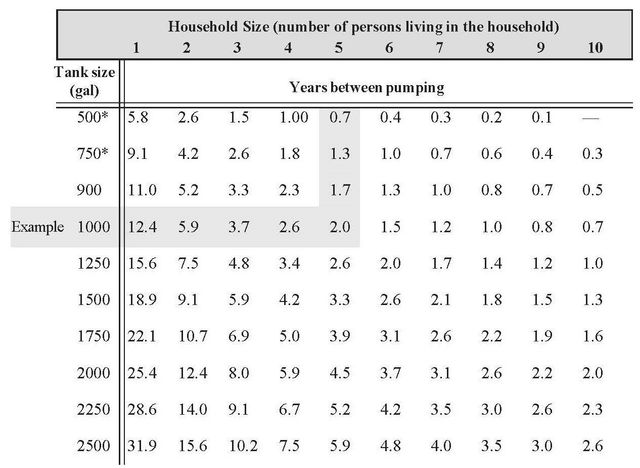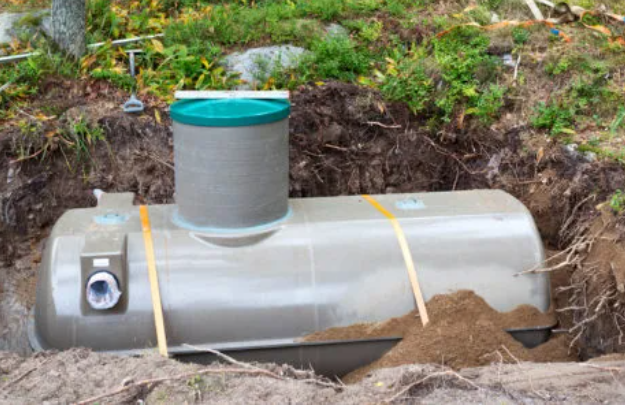I. What is a Septic Tank?
Septic tanks are an essential part of a home’s wastewater management system, especially in areas where there is no access to a centralized sewer system. They are underground tanks designed to collect and treat wastewater from households. Here is a brief description of the definition and role of a septic tank, as well as how septic tanks work.
Definition and Role of a Septic Tank
A septic tank is a watertight container made of concrete, fiberglass, or polyethylene, and it is buried underground. Its primary function is to collect and store wastewater from toilets, sinks, showers, and other household drains. The tank separates solids from liquids, allowing the solids to settle to the bottom of the tank while the liquids flow out into the drain field for further treatment.
How Septic Tanks Work
Septic tanks work through a simple process involving four main stages:
1. Inflow: Wastewater from the household enters the septic tank through an inlet pipe.
2. Separation: Once inside the tank, the wastewater undergoes a separation process. Heavier solids sink to the bottom, forming a layer of sludge, while lighter particles float to the top, creating a layer of scum. The liquid wastewater, known as effluent, remains in the middle of the tank.
3. Digestion: Naturally occurring bacteria and enzymes in the tank break down the organic materials in the sludge and scum, converting them into gases, liquid, and a smaller amount of residual solids.
4. Outlet: The effluent exits the tank through an outlet pipe, which leads it to the drain field. In the drain field, the effluent is further treated and ultimately filtered into the soil, where it undergoes the final stage of purification.
It is important to note that septic tanks require regular maintenance and pumping to ensure their proper functionality and longevity. The frequency of service depends on various factors, such as the tank’s size, the number of occupants in the household, and the volume of water used. It is generally recommended to have a septic tank pumped every three to five years to remove accumulated solids and prevent clogging or system failure.
Understanding the basics of septic tanks and their function is crucial for homeowners who rely on these systems. Regular maintenance and appropriate care will help ensure efficient wastewater management and prolong the lifespan of the septic tank.
II. Signs that your septic tank needs servicing
Common signs of septic tank issues
Maintaining a healthy septic tank is essential for the proper functioning of your home’s wastewater system. Here are some common signs that indicate your septic tank may need servicing:
- Slow draining: If you notice that your sinks, showers, or toilets are draining slowly, it could be a sign of a clogged septic tank. This could be caused by excess sludge or solid waste build-up.
- Unpleasant odors: Foul smells coming from your drains or backyard could indicate a septic tank problem. The presence of sewage odors suggests that the tank is not effectively processing and filtering waste.
- Pooling water: If you notice standing water or soggy areas in your yard, it could be a sign that your septic tank is overflowing. This can occur when the tank reaches its capacity and cannot properly drain waste.
- Gurgling sounds: Strange gurgling or bubbling noises coming from your drains or toilets could indicate a septic tank blockage or backup. This should be addressed immediately to prevent further damage to the system.
When to schedule a septic tank service
Regular septic tank maintenance is crucial to prevent costly repairs and ensure the longevity of your system. Here are some guidelines on when to schedule a septic tank service:
- Every 3-5 years: It is recommended to have your septic tank inspected and pumped every 3-5 years, depending on the size of your household and the usage of water. Regular pumping removes accumulated solid waste and sludge, preventing potential clogs and backups.
- Excessive water usage: If your household uses a substantial amount of water, such as having frequent guests or running a business, it’s advisable to have your septic tank serviced more frequently. Increased water usage can overload the system, leading to potential issues.
- System age: Older septic systems may require more frequent servicing as they may be more prone to wear and tear. Regular maintenance can help identify any potential problems and ensure the system is functioning properly.
Remember, neglecting septic tank maintenance can lead to costly repairs and environmental hazards. It’s important to consult a professional septic tank service provider to assess your system’s specific needs and determine the appropriate servicing schedule.
For more information on septic tank maintenance and wastewater management, visit Wikipedia’s page on septic tanks.

III. Factors Affecting Septic Tank Servicing Frequency
Maintaining a septic tank is vital to prevent issues such as sewage backups and drainage problems. The frequency at which you need to service your septic tank depends on several factors. Understanding these factors can help you determine when to schedule septic tank maintenance.
Number of Household Occupants
The number of people residing in your home affects the amount of wastewater generated. The more occupants, the greater the wastewater production, which means more strain on the septic tank. Larger households typically require more frequent septic tank servicing.
Tank Size and Capacity
The size and capacity of your septic tank determine how much wastewater it can hold. Smaller tanks have limited capacity and may require more frequent servicing compared to larger tanks. It’s important to know the size and capacity of your septic tank to determine the appropriate servicing frequency.
Water Usage Habits
Your water usage habits also play a significant role in septic tank maintenance. Excessive water usage, such as running multiple appliances simultaneously or using large amounts of water for activities like laundry, can overload the septic tank. Conserving water and practicing responsible water usage can help reduce the frequency of septic tank servicing.
It’s important to note that these factors are general guidelines, and other factors specific to your situation may also impact septic tank servicing frequency. Consulting a professional septic tank service provider can help you determine the appropriate servicing schedule based on your unique circumstances.
For more information on septic tank maintenance and servicing, you can visit this Wikipedia page.
Remember, regular septic tank servicing is essential to ensure the proper functioning and longevity of your septic system. Neglecting maintenance can lead to costly repairs and environmental hazards. Stay proactive and schedule regular septic tank servicing to keep your system running smoothly.

IV. Recommended frequency for septic tank servicing
Guidelines from experts and professionals
Keeping your septic tank in good working condition is crucial for proper waste management and avoiding potential health hazards. Regular servicing and maintenance of septic tanks are essential to ensure optimal performance. The frequency of septic tank servicing depends on various factors such as tank size, household occupancy, and water usage. Here are some general recommendations from experts and professionals:
- Annual Inspections: It is recommended to have your septic tank inspected by a professional once a year. This inspection will help identify any potential issues and ensure that the tank is functioning correctly.
- Pumping Frequency: The general rule of thumb is to have the septic tank pumped every 3 to 5 years. However, this can vary depending on factors such as the size of the tank, the number of people in the household, and the amount of water usage.
- Usage and Occupancy: If you have a larger household or use more water, you may need to have your septic tank serviced more frequently. Higher occupancy and increased water usage can result in faster accumulation of solids in the tank.
General recommendations based on tank size
The size of your septic tank also plays a role in determining the frequency of servicing. Here are some general recommendations based on tank size:
- Small to Medium Tanks: If you have a small to medium-sized septic tank (up to 1,000 gallons), it is generally recommended to have it serviced every 3 to 5 years.
- Large Tanks: If you have a larger septic tank (over 1,000 gallons), you may be able to extend the pumping frequency to every 5 to 7 years. However, it is still important to have regular inspections to ensure proper functioning.
Remember that these are general recommendations, and the specific needs of your septic tank may vary. Consulting with a professional septic tank service provider can help determine the optimal servicing frequency based on your specific circumstances.
Regular servicing and maintenance of your septic tank can prevent costly repairs and ensure the longevity of your system. Be sure to follow these recommendations and guidelines to keep your septic tank in excellent condition.
For more information on septic tank maintenance, you can visit Wikipedia’s septic tank page.

Importance of Regular Septic Tank Servicing
Benefits of Maintaining a Healthy Septic System
Regular septic tank servicing is essential to ensure the proper functioning and longevity of your septic system. Neglecting regular maintenance can lead to costly repairs and potential health hazards. Here are some key benefits of maintaining a healthy septic system through regular servicing:
1. Prevents system failures: Regular servicing helps identify and address any potential issues with your septic tank before they escalate into major problems. This includes checking for leaks, blockages, and signs of wear and tear.
2. Extends the lifespan of your septic system: Routine servicing helps keep your septic system in optimal condition, allowing it to last longer and save you money in the long run. By addressing minor issues early on, you prevent them from turning into major damage that may require expensive repairs or replacement.
3. Protects the environment: A well-maintained septic system ensures that wastewater is treated properly, preventing contamination of surrounding soil and groundwater. This helps protect the environment and avoids potential health risks associated with untreated sewage.
4. Saves you money: Regular septic tank servicing is a cost-effective way to avoid major repairs or replacements. By maintaining your septic system, you reduce the chances of emergency situations that can be more expensive to resolve.
5. Ensures compliance with regulations: In many areas, regular septic tank servicing is required by local regulations. By following these guidelines, you avoid potential fines and legal issues.
To ensure the proper functioning of your septic system, it is recommended to have your septic tank serviced every 3 to 5 years, depending on the size of your tank and household usage. Regular servicing should include pumping out the tank, inspecting for any issues, and performing necessary maintenance.
By regularly servicing your septic tank, you can enjoy peace of mind knowing that your system is functioning well and minimizing potential disruptions to your daily life. Remember, a well-maintained septic system is an investment in the long-term health of your home and the environment.
For more information on septic system maintenance and regulations, you can visit the Septic Tank Wikipedia page which provides comprehensive details on the topic.

VII. DIY vs professional septic tank servicing
When it comes to servicing your septic tank, you have two options: DIY maintenance or hiring a professional septic service provider. Each option has its pros and cons, and it’s essential to weigh them before making a decision.
Pros and cons of DIY maintenance
Pros:
- Cost-effective: DIY maintenance can save you money as you don’t have to pay for professional services.
- Convenience: You can schedule the maintenance at your convenience and take care of minor issues yourself.
Cons:
- Limited knowledge: If you’re not experienced or knowledgeable about septic systems, you may miss critical signs of a problem or make mistakes during maintenance.
- Potential damage: Mishandling the septic system can lead to more significant issues and expensive repairs.
- Time-consuming: DIY maintenance requires time and effort, especially for larger septic systems.
Reasons to hire a professional septic service provider
1. Expertise and knowledge: Professional septic service providers have extensive knowledge and experience in working with septic systems. They know how to properly inspect and maintain your tank, ensuring its optimal functioning.
2. Proper equipment and tools: Septic services use specialized equipment and tools that might not be readily available for DIY maintenance. These tools help in efficiently identifying and resolving septic issues.
3. Regular inspection and maintenance: Professionals can recommend a schedule for regular septic tank inspections and maintenance, helping prevent major problems before they occur.
4. Compliance with regulations: Septic tanks are subject to local regulations and guidelines. Professionals are well-aware of these requirements and ensure that your septic system complies with all the necessary regulations.
Ultimately, the decision between DIY maintenance and professional septic service depends on your comfort level, knowledge, and the complexity of your septic system. It’s always best to consult with a professional to determine the most suitable approach for your specific needs and requirements.

XI. Conclusion
Importance of regular septic tank servicing
Regular septic tank servicing is crucial for maintaining a healthy and efficient septic system. By scheduling regular maintenance and following a few simple guidelines, you can extend the lifespan of your septic tank and prevent costly repairs. Here are some key takeaways to remember:
- Schedule regular inspections: It is recommended to have your septic tank inspected at least once every three years by a licensed professional. They will check for any signs of damage or blockages and ensure that the tank is functioning properly.
- Pump out the tank: Depending on the size of your household, it is generally recommended to have the septic tank pumped out every three to five years. This will remove accumulated sludge and prevent the tank from getting overloaded.
- Practice proper maintenance: Avoid flushing non-biodegradable items, such as wipes or sanitary products, down the toilet. These can clog the system and cause damage. Additionally, avoid excessive water usage and divert rainwater away from the drain field.
Regular septic tank servicing is essential for preventing costly repairs and ensuring the longevity of your septic system. By taking proactive measures and following the guidance of a professional, you can keep your septic tank in optimal condition for years to come.
Remember, taking care of your septic tank is not only beneficial for the environment but also for your own well

